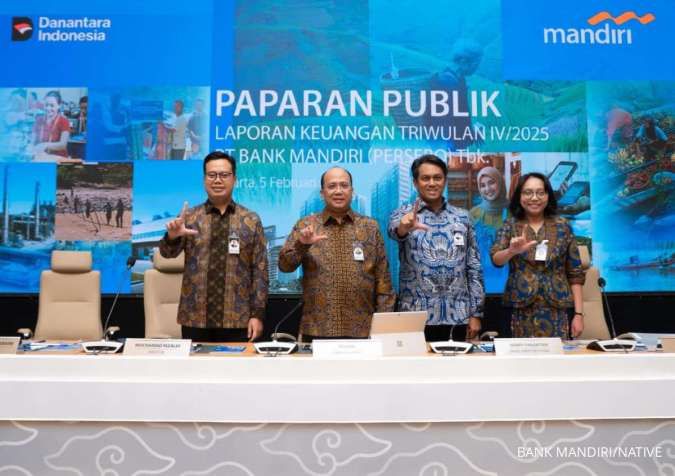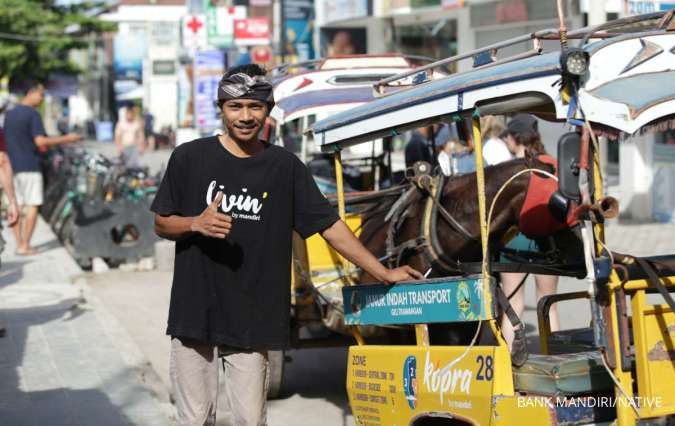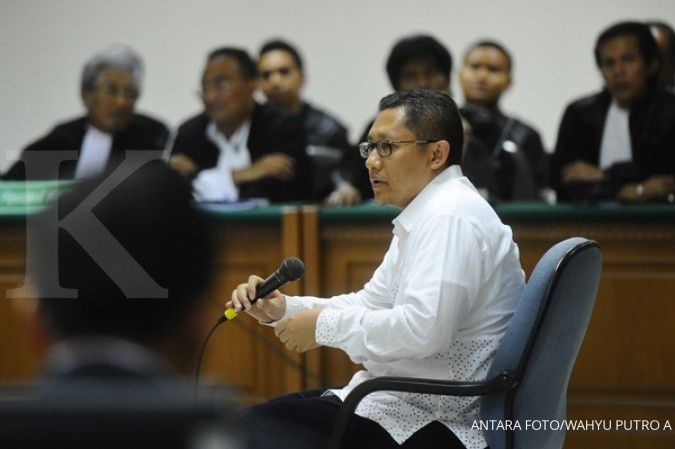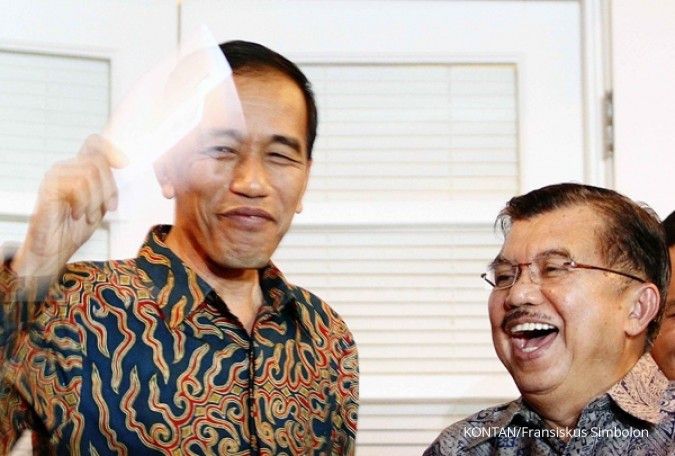JAKARTA. Internal rifts within the political factions at the House of Representatives over an amendment to the 2004 law on regional elections (Pilkada) have widened as decision day approaches, with the fate of direct elections now hanging in the balance. After previously announcing its support for maintaining the direct-election system, the Democratic Party faction insisted on Wednesday that it would only defend the mechanism in a vote during a plenary meeting slated for Thursday, if the draft included all of the 10 points of improvement proposed by the party; a condition that has been opposed by several of its own lawmakers. “The Democratic Party upholds democracy through the direct-election mechanism. But our support for the draft bill depends on our 10-point proposal being included,” lawmaker Nuki Sutarno told a hearing to present the factions’ official stances at the House Commission II on regional administration on Wednesday evening. The working committee tasked to deliberate the amendment has adopted nine of the 10 points. The only Democratic Party demand that has not been accepted is the call for a public review of candidates, which could allow an incumbent to block a rival candidate from running in a local election. Home Affairs Minister Gamawan Fauzi has also rejected the proposal due to concerns about “back-room deals”. “The government believes that such a requirement is unnecessary. It will potentially open opportunities for financial deals between candidates and those involved in reviewing them,” Gamawan said. No matter what, Democratic Party executives have insisted on the adoption of the stipulation. This is despite article 28 of the current draft detailing the procedures to be taken for candidates, as well as eligible voters participating in an election, to avoid vote-buying. “All [points] must be included [in the draft],” Democratic Party acting chairman Syariefuddin “Syarief” Hasan reiterated. Several Democrat lawmakers have expressed opposition to the demand, maintaining that the party’s support for the direct-election mechanism is unconditional. “Pak SBY [Susilo Bambang Yudhoyono] has announced that the Democratic Party would listen to the public’s aspirations and thus uphold the direct-election mechanism. The party supports this system. Period,” said lawmaker Ruhut Sitompul. President-elect Joko “Jokowi” Widodo’s Gotong Royong Coalition, which backs direct elections, only has 139 out of a total of 560 votes in the House. If the Dems follow party chairman Yudhoyono’s instruction the coalition will get an additional 148 votes, enough to uphold direct elections. Apart from the Democratic Party, parties within the Red-and-White Coalition, which nominated losing presidential ticket Prabowo Subianto and Hatta Rajasa, are also facing opposition from within over the move to abolish direct elections by returning the power to elect local heads to regional legislative councils (DPRDs). Aware of a possible rebellion among its lawmakers during the vote, the Golkar Party is set to dismiss anyone who dissents from the party’s line on the matter. “We have monitored those members who may contradict [our official stance]. It’s unlikely there will be more than 10 lawmakers who will do so. The number is not significant compared to the majority of us who support the party,” Golkar executive Bambang Soesatyo said. In addition to Golkar, the National Mandate Party (PAN) and the United Development Party (PPP) are also expecting trouble from within their ranks over the matter as both parties are struggling with internal moves to unite with the Indonesian Democratic Party of Struggle (PDI-P)-led coalition and join Jokowi’s Cabinet. (Margareth S. Aritonang)
Party stances crumble ahead of Pilkada vote
JAKARTA. Internal rifts within the political factions at the House of Representatives over an amendment to the 2004 law on regional elections (Pilkada) have widened as decision day approaches, with the fate of direct elections now hanging in the balance. After previously announcing its support for maintaining the direct-election system, the Democratic Party faction insisted on Wednesday that it would only defend the mechanism in a vote during a plenary meeting slated for Thursday, if the draft included all of the 10 points of improvement proposed by the party; a condition that has been opposed by several of its own lawmakers. “The Democratic Party upholds democracy through the direct-election mechanism. But our support for the draft bill depends on our 10-point proposal being included,” lawmaker Nuki Sutarno told a hearing to present the factions’ official stances at the House Commission II on regional administration on Wednesday evening. The working committee tasked to deliberate the amendment has adopted nine of the 10 points. The only Democratic Party demand that has not been accepted is the call for a public review of candidates, which could allow an incumbent to block a rival candidate from running in a local election. Home Affairs Minister Gamawan Fauzi has also rejected the proposal due to concerns about “back-room deals”. “The government believes that such a requirement is unnecessary. It will potentially open opportunities for financial deals between candidates and those involved in reviewing them,” Gamawan said. No matter what, Democratic Party executives have insisted on the adoption of the stipulation. This is despite article 28 of the current draft detailing the procedures to be taken for candidates, as well as eligible voters participating in an election, to avoid vote-buying. “All [points] must be included [in the draft],” Democratic Party acting chairman Syariefuddin “Syarief” Hasan reiterated. Several Democrat lawmakers have expressed opposition to the demand, maintaining that the party’s support for the direct-election mechanism is unconditional. “Pak SBY [Susilo Bambang Yudhoyono] has announced that the Democratic Party would listen to the public’s aspirations and thus uphold the direct-election mechanism. The party supports this system. Period,” said lawmaker Ruhut Sitompul. President-elect Joko “Jokowi” Widodo’s Gotong Royong Coalition, which backs direct elections, only has 139 out of a total of 560 votes in the House. If the Dems follow party chairman Yudhoyono’s instruction the coalition will get an additional 148 votes, enough to uphold direct elections. Apart from the Democratic Party, parties within the Red-and-White Coalition, which nominated losing presidential ticket Prabowo Subianto and Hatta Rajasa, are also facing opposition from within over the move to abolish direct elections by returning the power to elect local heads to regional legislative councils (DPRDs). Aware of a possible rebellion among its lawmakers during the vote, the Golkar Party is set to dismiss anyone who dissents from the party’s line on the matter. “We have monitored those members who may contradict [our official stance]. It’s unlikely there will be more than 10 lawmakers who will do so. The number is not significant compared to the majority of us who support the party,” Golkar executive Bambang Soesatyo said. In addition to Golkar, the National Mandate Party (PAN) and the United Development Party (PPP) are also expecting trouble from within their ranks over the matter as both parties are struggling with internal moves to unite with the Indonesian Democratic Party of Struggle (PDI-P)-led coalition and join Jokowi’s Cabinet. (Margareth S. Aritonang)





